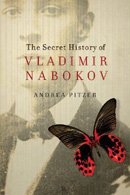About the author
Andrea Pitzer's writing has appeared many places in print and online, from USA Today and Slate to Poet Lore. She founded Nieman Storyboard, the narrative nonfiction site for the Nieman Foundation for Journalism at Harvard University.
 A graduate of Georgetown University's School of Foreign Service, Pitzer presented on the fiction of Vladimir Nabokov at the 2009 Modern Language Association conference in Philadelphia. She has spoken on narrative journalism in the U.S. and abroad. Also an artist, she has shown oil paintings in juried exhibitions from Rhode Island to Louisiana, and her work is held in private collections from coast to coast.
A graduate of Georgetown University's School of Foreign Service, Pitzer presented on the fiction of Vladimir Nabokov at the 2009 Modern Language Association conference in Philadelphia. She has spoken on narrative journalism in the U.S. and abroad. Also an artist, she has shown oil paintings in juried exhibitions from Rhode Island to Louisiana, and her work is held in private collections from coast to coast.
Pitzer lives with her husband and two children near Washington, DC, and The Secret History of Vladimir Nabokov is her first book. Find her on Twitter at @andreapitzer.
Interview with Marco Werman on PRI's "The World" (April 9, 2013)
Werman and I discuss Nabokov’s gift for outrunning history, 20th-century anti-Semitism, and Solzhenitsyn, among other things.
Werman: Yeah. I’m interested to know what critics have been saying to you about this book because so many people see Nabokov strictly, as you write, to “art for art’s sake”. Leave the back story out. What do you think about that and what have you heard?
Pitzer: It can be tricky because I think everybody, critics, scholars, general readers, have their own Nabokov. It’s like your own personal Jesus. They have their own Nabokov and some have felt that looking this closely at history is somehow to tie these stories down or to strip them of their magic in some way. And I would agree that if you just reduced his works to nothing but a series of chronological illusions, that would definitely be flattening the novels out. But I think to ignore this history that’s embedded in the books is really to miss half the story.
Hear the full interview and listen to an excerpt from the book at PRI's "The World."A talk with Royal Young of Interview Magazine (March 2013)
Young: It's so crazy that the persecution keeps popping up in terms of [Nabokov's] awareness of the world.
Pitzer: He could be a very cutting man. He was the master of the one-line barb, but he also had this tremendous sensitivity. Marrying a Jewish woman in the face of the anti-Semitism in Russia and the things he had seen in Nazi Germany heightened his sensitivity a lot. Also, the loss of his father was tremendously traumatic, and that shook the foundations of this very secure childhood. Suddenly you had the Russian Revolution, his family fleeing, and then his father is assassinated. He learned in a very narrow space that the world could come apart and developed a tremendous empathy for people who had been through that.
Young: What about his fascination with faded fame? What was his relationship to being a celebrity?
Pitzer: He got notoriety, but he wasn't really famous untilLolita the script. Once there was this scandalous book and the movie rights had sold, then he is fodder for the late-night monologues and gets really huge. At that point, you see him beginning to struggle with how to be that really public person. It seems increasingly over time, the answer was to close Vladimir Nabokov the person off and create this façade.
Young: What was the difference between the person and the façade?
Pitzer: [laughs] That could be the subject of many, many books. He wanted to control his life the way he controlled his books. In some ways as an adult, he tried to rearm himself with some of the protections of his childhood: to not be vulnerable to the world. sfas
Read the rest of the conversation with Royal Young at Interview Magazine.Q&A with Jon Winokur of AdviceToWriters.com (April 25, 2012)
JW: How did you become a writer?
AP: My grandparents owned a small-town bookstore just blocks away from my childhood home. I tried to weasel everything I could out of them, from Isaac Asimov to S.E. Hinton and Nancy Drew to Tolkien. Some things they wouldn't give me, of course. I was eight years old when Interview with the Vampire came out. I remember going to the county library and sneaking it off the display case when the fiction lady wasn't looking.
In the sixth grade, I won a Daughters of the American Revolution contest with an essay on Benjamin Franklin. Already sold on the writing life, I should have taken more note of the fact that the prize was a check for $5. I wish I still had that check.
JW: When and where do you write?
AP: I write anytime and anywhere I'm alone, which is harder than it sounds, because I have two small children. So I drag my laptop to an upstairs room in our home on weekends and write standing up at the dining room table during the day when the kids are at school. I stay up after everyone goes to bed, and my best stuff tends to surrender itself between 11PM and 2 AM.
JW: What's your advice to new writers?
AP: In the short run, set a schedule and write something. In the long run, find a story you can't not tell, and keep faith with it.
Read the rest of the Q&A at AdviceToWriters.com.
